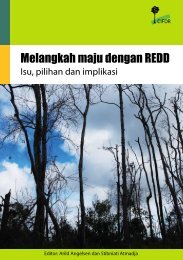Adaptive collaborative management of community forests in Asia ...
Adaptive collaborative management of community forests in Asia ...
Adaptive collaborative management of community forests in Asia ...
You also want an ePaper? Increase the reach of your titles
YUMPU automatically turns print PDFs into web optimized ePapers that Google loves.
Chapter 1: Introduction: People, Forests and the Need for Adaptation • 13<br />
the research was supported by the European Commission (under its tropical forest<br />
budget l<strong>in</strong>e), DFID and CIFOR. In Lat<strong>in</strong> America the research was supported by the<br />
US Agency for International Development and CIFOR.<br />
3 A source <strong>of</strong> confusion lies <strong>in</strong> the way the term action research has sometimes<br />
been used to refer to a process comb<strong>in</strong><strong>in</strong>g learn<strong>in</strong>g and action for change, without any<br />
real focus on research <strong>in</strong> the sense <strong>of</strong> production <strong>of</strong> public knowledge. We prefer to<br />
th<strong>in</strong>k <strong>of</strong> this sort <strong>of</strong> process as action learn<strong>in</strong>g (not unlike ACM) and reserve the terms<br />
action research and participatory action research for action learn<strong>in</strong>g processes where<br />
one outcome is the production <strong>of</strong> generalisable knowledge for application beyond the<br />
immediate context <strong>of</strong> action (Fisher and Jackson 1999).<br />
4 David Hume, Treatise <strong>of</strong> Human Nature.<br />
5 Follow<strong>in</strong>g discussions with the project’s Steer<strong>in</strong>g Committee <strong>in</strong> Nepal <strong>in</strong><br />
November 2000, the ACM <strong>Asia</strong> team adopted the phrase ‘plausible causal connections’<br />
as an <strong>in</strong>formal motto.<br />
References<br />
Anderson, J., Clement, J. and Crowder, L.V. 1998 Accommodat<strong>in</strong>g<br />
conflict<strong>in</strong>g <strong>in</strong>terests <strong>in</strong> forestry—concepts emerg<strong>in</strong>g from pluralism.<br />
Unasylva 194, 49(3): 3-10.<br />
Borr<strong>in</strong>i-Feyerabend, G. (ed.) 1997 Beyond fences: seek<strong>in</strong>g social<br />
susta<strong>in</strong>ability <strong>in</strong> conservation. IUCN, Gland, Switzerland.<br />
Checkland, P.B. 1985 Systems th<strong>in</strong>k<strong>in</strong>g systems practice. John Wiley &<br />
Sons Ltd., Chichester.<br />
Colfer, C.J.P. and Capistrano, D. (eds.) 2005 The politics <strong>of</strong> decentralization:<br />
<strong>forests</strong>, power and people. Earthscan, London.<br />
Colfer, C.J.P., Prabhu, R., Gunter, P.M., McDougall, C., Porro, N.M. and<br />
Porro, R. 1999 Who counts most? Assess<strong>in</strong>g human well-be<strong>in</strong>g <strong>in</strong><br />
susta<strong>in</strong>able forest <strong>management</strong>. C&I Toolbox Series No 8. CIFOR,<br />
Bogor.<br />
Edmunds, D. and Wollenberg, E. 2003 Local forest <strong>management</strong>: the<br />
impacts <strong>of</strong> devolution policies. Earthscan, London.<br />
FAO, 1978 Forestry for local <strong>community</strong> development. FAO Forestry Paper<br />
No. 7, Food and Agriculture Organization <strong>of</strong> the United Nations,<br />
Rome.<br />
Fisher, R.J. 1995 Collaborative <strong>management</strong> <strong>of</strong> <strong>forests</strong> for conservation<br />
and development. WWF International and IUCN The World<br />
Conservation Union, Gland, Switzerland.<br />
Fisher, R.J. 1999 Devolution and decentralization <strong>of</strong> forest <strong>management</strong> <strong>in</strong><br />
<strong>Asia</strong> and the Pacific. Unasylva 50(4): 3-5.
















